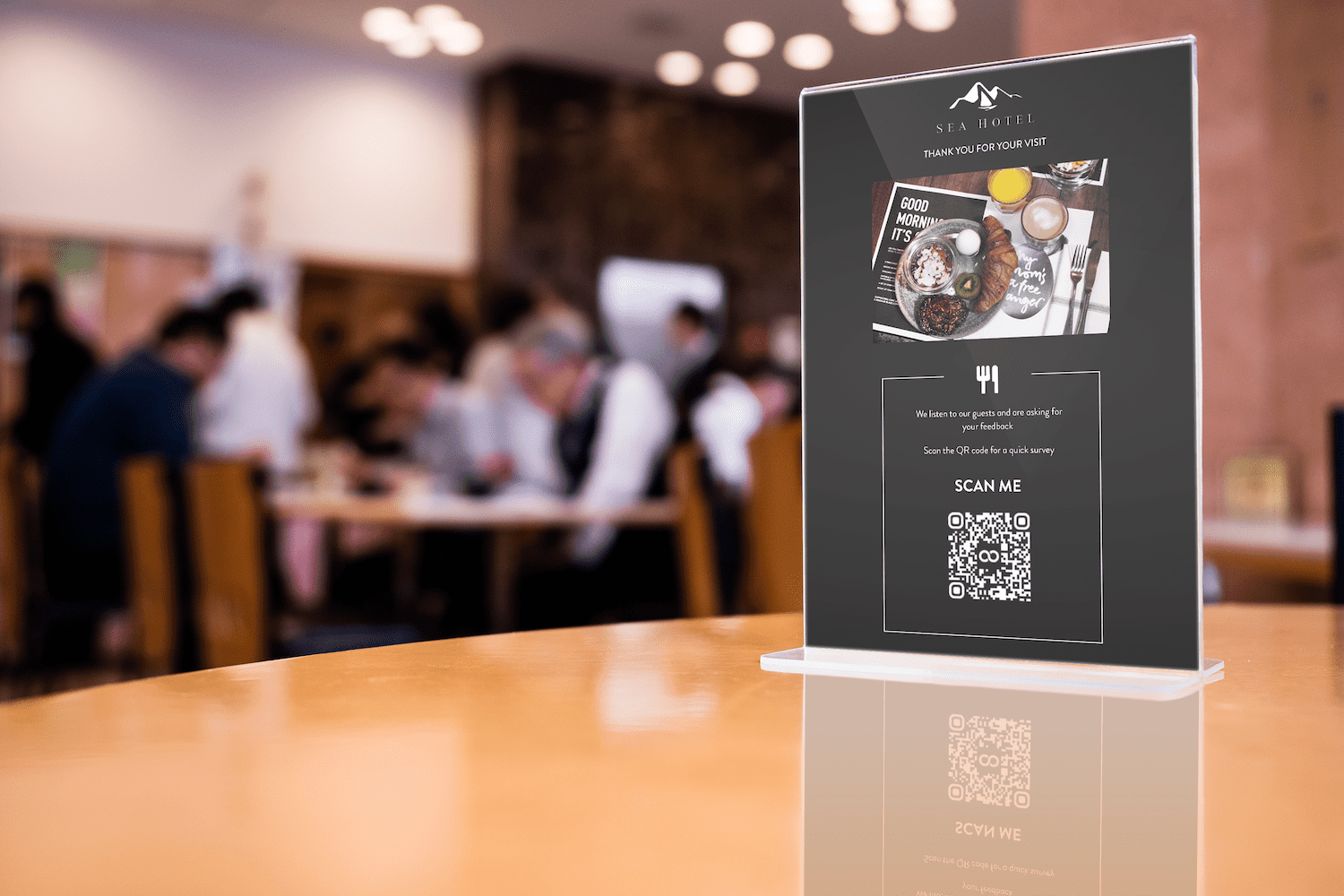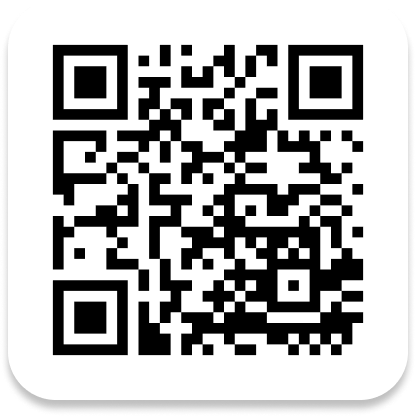QR Codes and Customer Service
Customer service quality is the embodiment of the hospitality industry. Utilize QR codes to enhance guest service and offer higher-quality services. Retain existing customers, generate new potential clients, and increase return on investment.
Over the past few years, the hospitality industry has widely adopted QR codes, largely driven by the pandemic. The contactless nature of QR codes and their ease of use have earned them an excellent reputation.
We have come a long way from basic applications, such as providing menus through QR codes and enabling contactless check-ins, to launching QR code-based marketing campaigns and generating revenue.
In this article, we will explore the evolution of the hospitality industry, along with some key benefits of using QR codes and examples of their real-world applications.
Over the past few years, the hospitality industry has widely adopted QR codes, largely driven by the pandemic. The contactless nature of QR codes and their ease of use have earned them an excellent reputation.
We have come a long way from basic applications, such as providing menus through QR codes and enabling contactless check-ins, to launching QR code-based marketing campaigns and generating revenue.
In this article, we will explore the evolution of the hospitality industry, along with some key benefits of using QR codes and examples of their real-world applications.

New Trends in Hospitality and the Implementation of QR Codes
Three trends have shaped the hospitality industry in recent years:
QR codes have addressed these three pain points for the hospitality industry, providing a seamless and cost-effective solution. This is primarily because QR codes are 100% contactless and offer customers an enhanced digital interface.
From hotel chains to amusement parks, major global players in the hospitality industry have begun leveraging QR codes for their business needs. Let's delve into this further in the next section, where we will discuss the advantages that QR codes can offer in the field of hospitality.
- Heightened focus on hygiene, safety, and cleanliness.
- Climate change concerns have led to a special emphasis on environmentally friendly and sustainable solutions.
- A sophisticated clientele demanding a more digital experience.
QR codes have addressed these three pain points for the hospitality industry, providing a seamless and cost-effective solution. This is primarily because QR codes are 100% contactless and offer customers an enhanced digital interface.
From hotel chains to amusement parks, major global players in the hospitality industry have begun leveraging QR codes for their business needs. Let's delve into this further in the next section, where we will discuss the advantages that QR codes can offer in the field of hospitality.
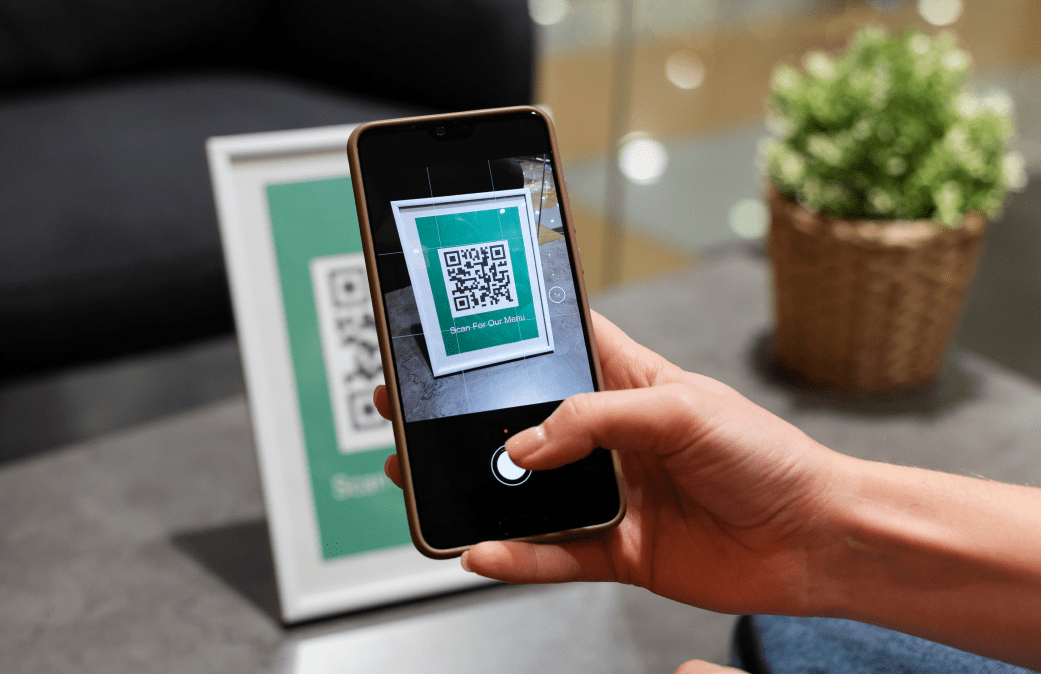
4 "C"s of the Hospitality Industry and How QR Codes Benefit Them
The benefits of using QR codes in the hospitality industry can be embodied through four "C"s:
Customer Service
The hospitality industry is nothing but the embodiment of customer service. A warm welcome and experiences that make guests feel like celebrities are the essence of hospitality.
Excellent customer service means delighting the customer at every touchpoint. In the case of a hotel, it starts with the booking process, extends to check-in, and continues through every stage of their stay and beyond.
How QR Codes Help:
Modern customers dislike waiting. Guest satisfaction rates drop by 50% if registration involves waiting for even five minutes.
Simple implementation of QR codes during hotel check-in can enhance customer service quality, reduce wait times, and improve the overall customer journey.
Moreover, you can incorporate QR codes in hotel rooms to provide more information about services such as spa facilities, restaurant menus, local tourist attractions, and more.
Excellent customer service means delighting the customer at every touchpoint. In the case of a hotel, it starts with the booking process, extends to check-in, and continues through every stage of their stay and beyond.
How QR Codes Help:
Modern customers dislike waiting. Guest satisfaction rates drop by 50% if registration involves waiting for even five minutes.
Simple implementation of QR codes during hotel check-in can enhance customer service quality, reduce wait times, and improve the overall customer journey.
Moreover, you can incorporate QR codes in hotel rooms to provide more information about services such as spa facilities, restaurant menus, local tourist attractions, and more.
Customer Loyalty
A powerful and consistently high-quality customer experience can create customer loyalty. It goes beyond serving customers within the establishment; it's the answer to the question: What makes you come back to this cafe?
How QR Codes Can Help:
Reviews, QR codes for loyalty programs, and online reviews can be an excellent way to engage your guests long after they've used your services.
75% of consumers prefer a brand if there is a loyalty program that rewards participants. Therefore, implementing special loyalty reward programs is an intriguing way to boost customer loyalty through QR codes.
For example, you can develop a points-based incentive program similar to what Starbucks offers. You can also consider using QR codes at billing counters or in promotional materials to promote points-based reward programs, conduct customer surveys, and more.
How QR Codes Can Help:
Reviews, QR codes for loyalty programs, and online reviews can be an excellent way to engage your guests long after they've used your services.
75% of consumers prefer a brand if there is a loyalty program that rewards participants. Therefore, implementing special loyalty reward programs is an intriguing way to boost customer loyalty through QR codes.
For example, you can develop a points-based incentive program similar to what Starbucks offers. You can also consider using QR codes at billing counters or in promotional materials to promote points-based reward programs, conduct customer surveys, and more.
Convenience
Hospitality is not just about providing convenience to your customers; it's also about expanding opportunities for your staff and freeing up their time to focus on delivering excellent service and building relationships.
This is where technology and automation can play a crucial role. Making the entire customer service process convenient and intuitive is akin to creating an app with a fantastic user interface.
How QR Codes Help:
The hotel staff can automate several repetitive operations and secure data in one place for strategic use with QR codes. No more stacks of paper for guest registration or manual order taking in the restaurant. This helps eliminate the possibility of errors, allowing the staff to focus on what they do best—delighting customers by providing best-in-class service.
Another advantage for hospitality businesses is that when a customer scans a QR code, they share important information and data. Business and marketing teams can use this to enhance customer convenience.
For instance, consider a customer who placed their order through a QR code menu and exclusively chose vegan dishes in your restaurant. Their preferences become valuable data stored in your restaurant's database. You can use this and similar scan data to further enhance loyalty or for personalized marketing campaigns—in this case, promoting special vegan dishes to attract like-minded customers.
This is where technology and automation can play a crucial role. Making the entire customer service process convenient and intuitive is akin to creating an app with a fantastic user interface.
How QR Codes Help:
The hotel staff can automate several repetitive operations and secure data in one place for strategic use with QR codes. No more stacks of paper for guest registration or manual order taking in the restaurant. This helps eliminate the possibility of errors, allowing the staff to focus on what they do best—delighting customers by providing best-in-class service.
Another advantage for hospitality businesses is that when a customer scans a QR code, they share important information and data. Business and marketing teams can use this to enhance customer convenience.
For instance, consider a customer who placed their order through a QR code menu and exclusively chose vegan dishes in your restaurant. Their preferences become valuable data stored in your restaurant's database. You can use this and similar scan data to further enhance loyalty or for personalized marketing campaigns—in this case, promoting special vegan dishes to attract like-minded customers.
Campaigns and Conversions
In the digital world, establishments don't have to strive to maintain a conversation after a customer leaves. From lead generation to retargeting and post-sale communication, post-purchase experience is crucial and can impact your business's profitability.
How QR Codes Help:
When used correctly, QR codes can provide detailed data on scan counts, demographics, preferences, and more. When a customer scans a QR code in a hotel, they are added to a retargeting list. Advertisements for that specific hotel will appear on other platforms they may browse.
These insights enable businesses to create targeted marketing campaigns, improving conversion rates by tailoring promotions to specific customer preferences and behaviors. QR codes thus serve as a bridge between the physical and digital realms, enhancing the overall effectiveness of marketing efforts in the hospitality industry.
Global hotel brands are leveraging QR codes to enhance customer service quality, with various applications across the hospitality sector. Here are some notable examples:
How QR Codes Help:
When used correctly, QR codes can provide detailed data on scan counts, demographics, preferences, and more. When a customer scans a QR code in a hotel, they are added to a retargeting list. Advertisements for that specific hotel will appear on other platforms they may browse.
These insights enable businesses to create targeted marketing campaigns, improving conversion rates by tailoring promotions to specific customer preferences and behaviors. QR codes thus serve as a bridge between the physical and digital realms, enhancing the overall effectiveness of marketing efforts in the hospitality industry.
Global hotel brands are leveraging QR codes to enhance customer service quality, with various applications across the hospitality sector. Here are some notable examples:
W Hotels' Hotel Promotion
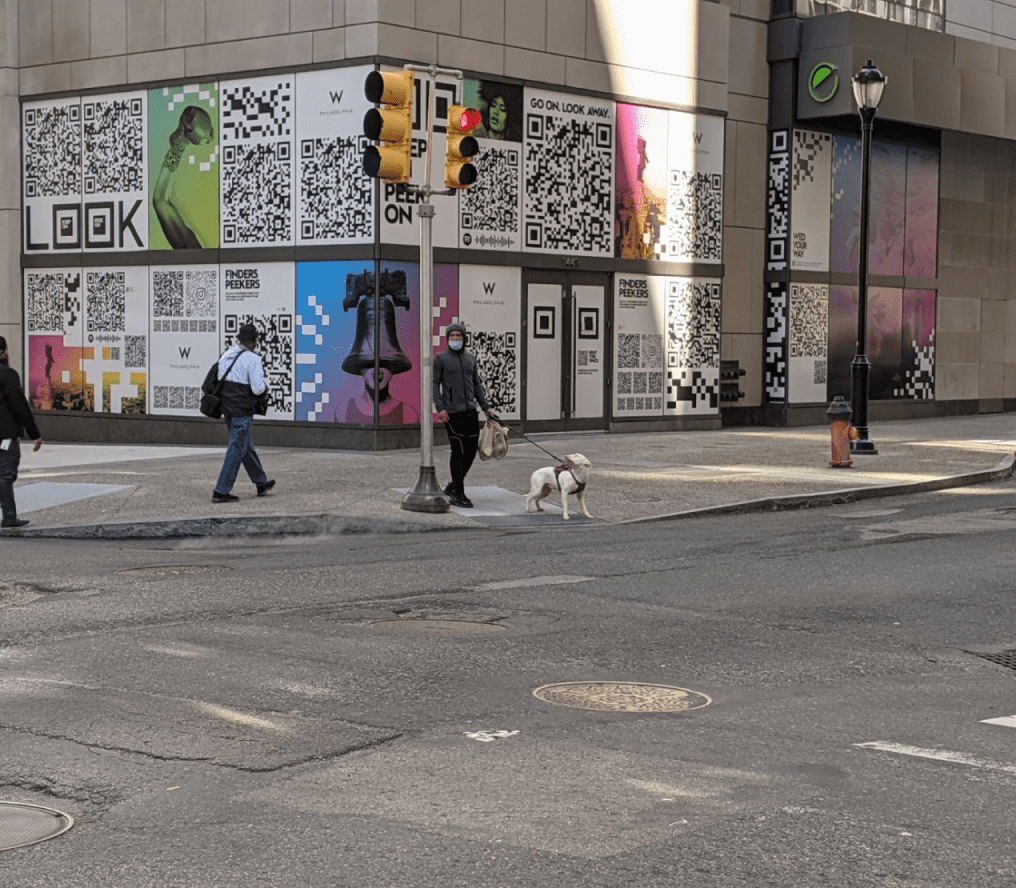
A construction site in Philadelphia was covered with QR codes as part of a unique promotion by W Hotels. The concept was simple: upon scanning, people could learn about a new branch of the W Hotels network set to emerge in that location. A distinctive way to capture the interest of passersby.
QR Codes in Central Park, New York
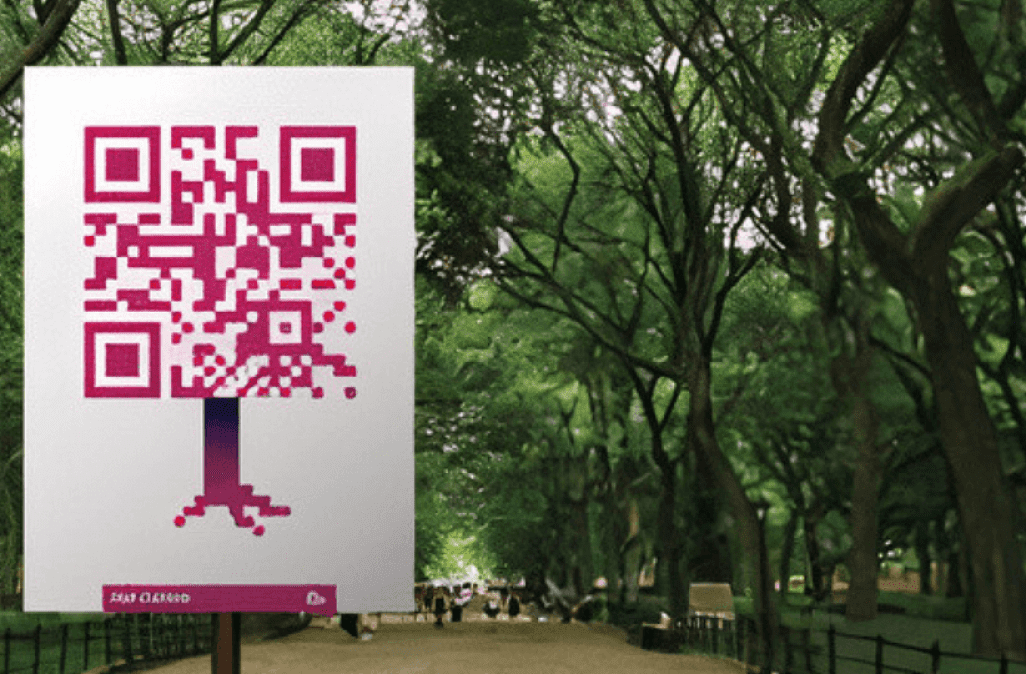
For Arbor Day in 2011, Central Park in New York launched the World Park campaign, where tree-shaped QR codes were placed throughout the park. Upon scanning, visitors could view scenes from movies, access historical information, and even participate in interactive games. An engaging way to blend technology with the natural environment.
Disneyland's QR Code Location Navigation
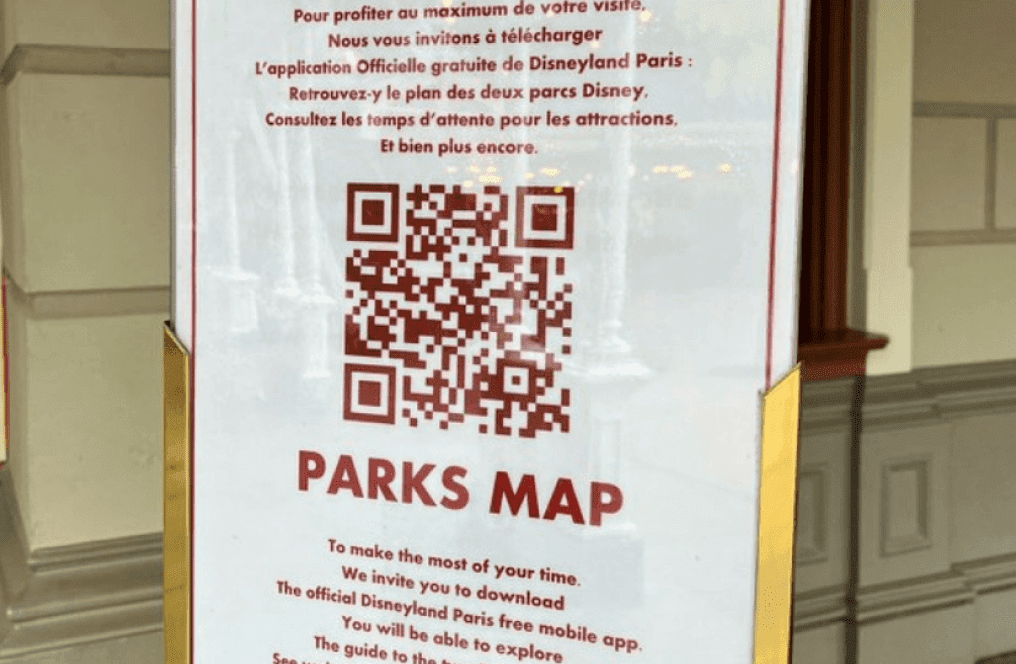
Maps with QR codes provide an efficient and sustainable way to locate points of interest such as cafes, popular attractions, and restrooms in amusement parks and zoos. Additionally, shopping centers can utilize QR codes to find free parking spaces.
For instance, Disneyland Paris was among the pioneers in abandoning paper maps and implementing QR code-enabled maps. Visitors could navigate through the park using the QR codes in their application, enhancing convenience and reducing reliance on traditional printed materials.
These examples demonstrate how QR codes are not only streamlining operational aspects but also adding an interactive and engaging element to the guest experience in the hospitality industry.
For instance, Disneyland Paris was among the pioneers in abandoning paper maps and implementing QR code-enabled maps. Visitors could navigate through the park using the QR codes in their application, enhancing convenience and reducing reliance on traditional printed materials.
These examples demonstrate how QR codes are not only streamlining operational aspects but also adding an interactive and engaging element to the guest experience in the hospitality industry.
Questions & Answers
What are the benefits of QR codes in the hospitality industry?
QR codes can be utilized throughout the entire customer lifecycle to ensure a seamless and hassle-free customer experience in the hospitality sector. This includes improvements during registration, access to digital menus, placing orders, making payments, collecting reviews, and online feedback. Additionally, they can be used to exchange information about a product or destination.
What is the trend in the use of QR codes in the hospitality industry?
Over the past few years, especially after the pandemic, QR codes have become extremely popular in the hospitality industry due to their 100% contactless nature. Thanks to their digital essence, QR codes offer an advantage by providing contactless and environmentally friendly customer service convenience.
How are QR codes used in tourism?
The travel and tourism sector utilizes QR codes to exchange information with tourists about specific destinations, routes, directions, and attractions around a particular destination. QR codes are also used for collecting reviews and ratings, as well as increasing the number of followers on social media.
Which QR codes are used for restaurants?
In restaurants, QR codes are used diversely, but the most popular ones are digital menus that can be easily scanned with a mobile device. You can create and update menus using dynamic QR codes. Restaurants also streamline payment processes through QR codes, enhancing overall customer convenience.

